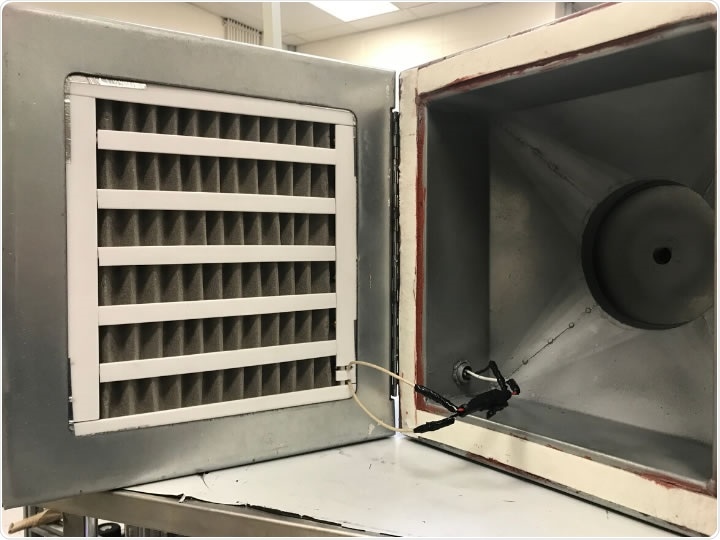The COVID-19 pandemic has to date affected over 13.28 million individuals and killed over 577,000 across the world. As the pandemic rages on, there are no drugs or vaccines that can neutralize the severe acute respiratory syndrome coronavirus 2 (SARS-CoV-2).
This highly infectious virus is transmitted via aerosols or droplets that are released when an infected person talks, coughs, or sneezes. Facemasks are thus one of the primary protective measures to prevent the spread of infection from an infected person to a healthy individual. However, studies have shown that not all masks are 100 percent effective in preventing the infection. Air filters that can clear away the virus from the aerosols released are also a hot topic of research at present.
Now researchers from the University of Houston have come up with a unique air filter system that can catch and kill the novel coronavirus. The air filter can reportedly kill the coronavirus on contact. It works on the principle of heat that is capable of killing the virus because it cannot withstand high temperatures. This could be utilized in hospitals, schools, and offices where a large number of people gather, and a potentially infected person could spread the virus to other non-infected persons, say researchers.
An article describing the air filtration system, its workings and usefulness is published in the latest issue of the Materials Today Physics.

Transmission of Coronaviruses
Coronaviruses are known to remain suspended in the air for a while, and during this time, those who inhale the virus-laden air, are capable of getting infected say researchers. Other airborne infections such as flu can also spread in this manner, but the infectivity of coronaviruses surpasses that of the flu virus.
The air filtration system – killing them with heat
The air filtration system is capable of killing 99.8 percent of the SARS-CoV-2 from when virus-laden air passes through it once. The system contains a heating element that heats up to around 392 degrees Fahrenheit (around 200 degrees Celsius). The researchers wrote that the coronavirus cannot survive over temperatures of 158 degrees Fahrenheit (70 degrees Celsius). Thus this air filtration system is capable of killing the coronaviruses on contact. The device is also capable of killing 99.9 percent of the spores of the Bacillus anthracis, which causes anthrax.
The system is made up of nickel foam wrote the researchers, which acts as the heating element. The University of Houston released a statement explaining the filtration system, they wrote, “...nickel foam has low resistivity, making it difficult to raise the temperature high enough to quickly kill the virus. The researchers solved that problem by folding the foam, connecting multiple compartments with electrical wires to increase the resistance high enough to raise the temperature as high as 250 degrees C. By making the filter electrically heated, rather than heating it from an external source, the researchers said they minimized the amount of heat that escaped from the filter, allowing air conditioning to function with minimal strain.”
Need for such an air filtration system
The coronavirus pandemic led to a standstill in many parts of the world. To avoid viral spread, all large gatherings, schools, restaurants, cinema halls, meetings, concerts, stadiums, museums, etc. were closed down temporarily. Travel, especially international travel, airports have also been shut down in many regions. As the virus continues to infect people, economies are slowly trying to revive themselves, and businesses are opening up amidst precautions of masks and social distancing.
This air filtration system could be useful in these settings, including hospitals, schools, airports, malls, etc. One of the researchers, Zhifeng Ren, director of the Texas Center for Superconductivity at UH, said in his statement, “This filter could be useful in airports and airplanes, in office buildings, schools, and cruise ships to stop the spread of COVID-19.” He added that the nickel foam that this system used was the breakthrough. It allowed them to meet the design needs for an air filtration system against coronavirus. He added, “It is porous, allowing the flow of air, and electrically conductive, which allowed it to be heated. It is also flexible.”
Faisal Cheema, another researcher on the team, said, “This novel biodefense indoor air protection technology offers the first-in-line prevention against environmentally mediated transmission of airborne SARS-CoV-2, and will be on the forefront of technologies available to combat the current pandemic and any future airborne biothreats in indoor environments.”
Way forward
According to Ren and colleagues, there is much potential for the use of this device in the future. A prototype filtration system made by the team was effective, he said. The device also meets the present requirements for an HVAC (heating, ventilation, and air conditioning) system and would soon be manufactured on a large scale.
It could help make workplaces, schools, hospitals, and public transport safer in the future believe the researchers. Partnering with the University of Houston on this project is Monzer Hourani, CEO of Medistar. Medistar is a Houston-based medical real estate development firm. From Medistar Garrett K. Peel said, “Schools, transit systems, hospitals, airplanes, office buildings, other health care facilities, and public settings would be first in line to receive the devices.”
Source:
Journal reference:
- Luo Yu, Garrett K. Peel, Faisal H. Cheema, William S. Lawrence, Natalya Bukreyeva, Christopher W. Jinks, Jennifer E. Peel, Johnny W. Peterson, Slobodan Paessler, Monzer Hourani, Zhifeng Ren, Catching and killing of airborne SARS-CoV-2 to control spread of COVID-19 by a heated air disinfection system, Materials Today Physics, https://doi.org/10.1016/j.mtphys.2020.100249